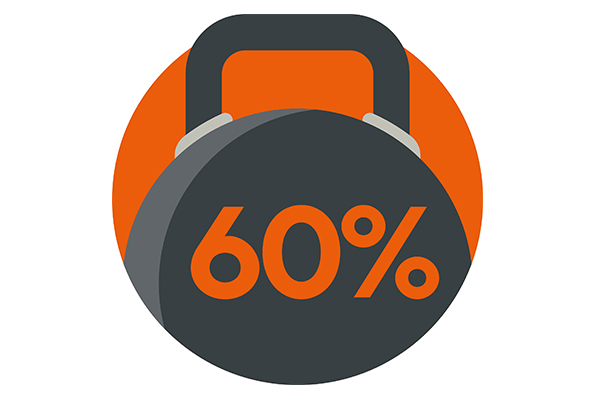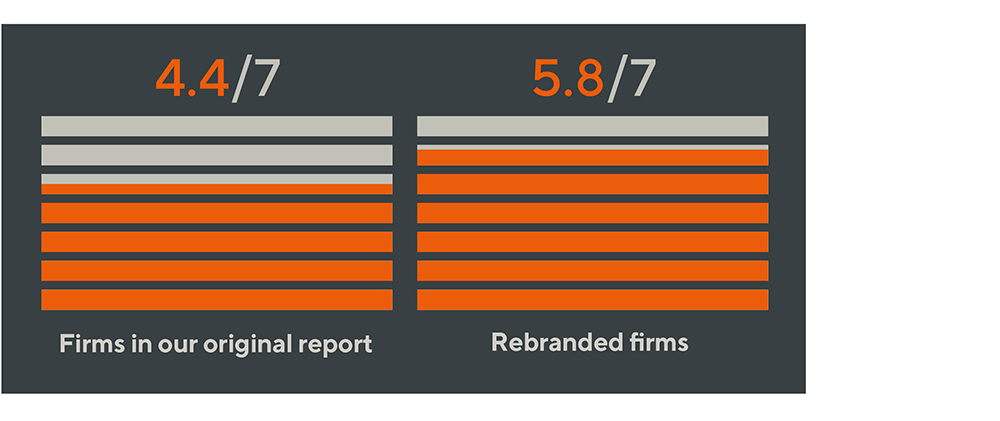In January 2019 we launched our research report benchmarking brand strength across the private equity sector. We scored and ranked the brand strength of a cross-section of UK based mid-market private equity (PE) firms typically investing anywhere up to £50M within Europe. Using our brand expertise, we analysed the data – making reasonable assumptions – to draw insights about brand strength across the PE sector as a whole. Read our report.
Since we completed our scoring in 2018, 10% of the firms we looked at have refreshed their brand and launched a new website. This demonstrates that firms are recognising the importance of a stronger brand and are investing time and money to make improvements. We thought it would be interesting to repeat our scoring with these firms to see the impact of their work.
Only 60% of rebranded firms now meet our overall brand strength benchmark

What did we find?
Only 60% of the firms who launched a new website increased their overall brand strength score enough to meet or exceed our benchmark. Analysing the scores, we can see that firms improved their online brand experience scores by 59%, but their brand foundation scores only improved by 27%. This indicates that the new websites have improved their user experience but firms have neglected to take the time to develop a robust brand foundation and amplify this across their new website, which has meant their brand strength has not sufficiently improved.
Why this is important?
A robust brand foundation + a meaningful brand experience = a strong brand
Establishing a robust brand foundation is vital to building a long lasting, strong brand. This solid base of clarity acts as a North Star for all business activities, without it you are building a façade with no foundations, which is unlikely to remain standing for long.
A strong brand foundation streamlines and boosts a PE firm’s business development work. Clarity about your positioning within the sector and your value proposition to target audiences enables a sharper sales approach with clear and purposeful communication. Hedging your bets and trying to be all things to all people are no longer viable business strategies. By understanding and amplifying your compelling point of difference, a strong brand foundation enables PE firms to narrow their sales funnel and load it with quality leads that are ripe for converting.
How can firms improve?
Discovering your brand foundation should be both an inward and outward looking process. Getting under the bonnet of your business, slipping into the shoes of your target audience and doing some homework on your competitors, will all help you to hone your compelling point of difference. Strong brands know the value of their offer, beyond the attributes that are common across all other PE firms and relevant to their target audience.
Once a firm has clarified and simplified their brand foundation, this then needs to be effectively and consistently amplified across all touch points. For example, your visual identity and personality should amplify your brand, enabling audiences to easily distinguish you from your competitors as well as attracting and engaging those you want to do business with.
Rebranded firms are better positioned to stand out from the crowd
What did we find?

The average score for position for all of the firms in our original research was below our benchmark of 5 out of 7 at only 4.4, indicating that there is a lack of distinction across the sector. For the firms who have recently launched a new website, their score for position increased by 81% to an average of 5.8 out of 7, elevating them above other PE firms with a clearer position within the sector.
Why this is important?
With fierce competition in both the PE industry and across the broader capital finance industry, PE firms need to establish and occupy a defendable territory in order to win deals at the right price. A strong position gives clarity to the value of your offer and how it is better than available alternatives. This places a firm in a strong position not only to compete for deals but also to negotiate deals at the right price.
A strong brand position also places a firm top of mind within the firm’s network of stakeholders and contacts, with a strong reputation as the firm of choice within their area of expertise. This will open more opportunities for you to hear about deals before the rest of the market, giving you a competitive advantage.
How can firms improve?
Your positioning should amplify the true value of your offer and how it satisfies the target audiences needs best. To do this, firms must have a thorough understanding of their target audience’s ambitions, challenges and pain points as well as the value of the offers of direct competitors. A strong position should also be relevant to the current environment you are operating in (e.g. PESTLE), this means it needs to be organic and reviewed regularly to remain agile and positioned to maximise opportunities.
Firms have not simplified and amplified their offer beyond capital and credentials
What did we find?
None of the firms we looked at met our benchmark for purpose after their brand refresh and new website launch. A strong purpose is something that we found many PE firms struggle with as only 27% of firms in our original research met our benchmark for purpose. This highlights that many PE firms across the sector are not simplifying and clearly articulating why they exist in a way that is meaningful to their target audience.
Why this is important?
Successful brands elicit an emotional response. If you don’t make people care, you won’t earn market share. Your purpose should communicate why your firm exists, what your ultimate goal is beyond making a profit. This will positively resonate with your target audience, self-selecting those people you want to do business with.
These leads will naturally have an affinity to your brand and through a sharpened sales approach will understand the value your firm can bring to their business beyond those that are common across all PE firms. This positions your firm as highly desirable, putting you in a better position of power during deal negotiation to win the right deals at the right price.
The Harvard Business Review and EY’s Beacon Institute found that a strong purpose has a positive impact on revenue. They discovered that 58% of companies with a clearly articulated and understood purpose experienced a revenue growth of +10% over a three-year period. Compared to 42% of companies with a purpose that was not well understood or communicated who experienced a plateau or decline in revenue growth over the same period(1).
How can firms improve?
A strong purpose articulates what the world will look like after the firm has accomplished its ultimate goal. It should be more than making a profit; it should be what the firm cares about deeply, your enduring why. Once identified it needs to be clearly and consistently articulated across all touch points and be embedded in everything the firm does today, tomorrow and for years to come.
Summary
Developing a strong brand is an evolution, not a revolution. Firms need to take a considered approach and ensure they hone their brand foundation before moving onto designing the online brand experience of their website. Simply launching a new website does not guarantee you will improve the strength of your brand and reap the benefits from it. Firms must take a holistic approach, or risk continuing to be left behind by their competitors, losing out on future business opportunities and essentially wasting money in building a new website.
References:
(1) Harvard Business Review, (2015). The business case for purpose. Accessed 21 November 2018. Retrieved from https://www.ey.com/Publication/vwLUAssets/ey-the-business-case-for-purpose/%24FILE/ey-the-business-case-for-purpose.pdf
